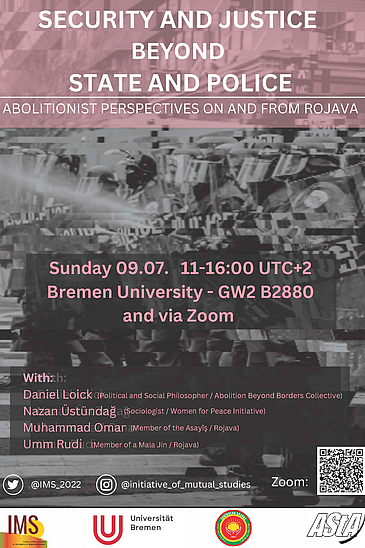via Zoom: https://uni-bremen.zoom.us/j/64396967513?pwd=TDZhMUFUS0djSVppNEt1dXgwMTNFdz09
THE SPEAKERS
Daniel Loick is professor of political and social philosophy, co-editor of "Abolitionismus - Ein Reader" and member of the "Abolition Beyond Borders Collective."
Nazan Üstündağ is sociologist, a founding member of the Women for Peace Initiative, and author e.g. of "Self-defense as a Revolutionary Practice in Rojava."
Muhammad Omar is a member of the Asayîş in Rojava. He will talk about aspects of the security system and prisons in Rojava.
Umm Rodi has been working for 10 years at a "Mala Jin." She will talk about her work and aspects of community accountability and transformative justice in Rojava.
For some time now, debates and practices around abolitionism have been attracting more and more attention in Germany. Police, prisons and other "security" institutions are seen as repressive towards progressive social change. We are increasingly asking questions like, "What would a world without police and prisons look like?" or, "What are the alternatives?".
In north-eastern Syria (Rojava), on the other hand, a revolution has been underway for several years. Many areas of society have changed. But the revolution is attacked again and again - be it by the so-called Islamic State (IS), by the Turkish state, or by people who are not ready to give up their power and privileges (e.g. men resisting the emancipation of women). Notions and practices of security and self-defense play a role at all levels of society in the revolution. The social revolution strives for a non-state model of society - what implications does this have for the way security is organised?
Together with experts on the theory of abolitionism, representatives of the security and legal system in Rojava, students of the University of Bremen and the University of Rojava (Qamishlo), and all other interested parties, we will talk about abolitionism, as well as legal and security policy before and during the revolution.
Regarding ABOLITIONIST PERSPECTIVES we will be asking:
What is abolitionism? What (revolutionary) perspectives lie in this approach? How can there be justice without a state? How can there be security without police?
...ON AND FROM ROJAVA
How does policing work in Rojava? Are there alternatives? What role do community accountability and transformative justice play in the security and justice system in Rojava? What approaches to abolitionism can be found in the autonomous self-government in north-eastern Syria?
The event is organized by "Initiative of Mutual Studies of the Students of Rojava and Bremen" (IMS) in cooperation with the "Institut für Ethnologie und Kulturwissenschaft" (IfEK) and is supported by Zanîngeha Rojava / University of Rojava and AStA of Bremen University.
The event will be translated into English and Kurdish (Kurmancî).
You can find more information in the flyer.
JOIN US!

